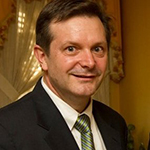Director, Cornell University Press
 Please tell us a bit about yourself (e.g. hometown, current locale, course of study).
Please tell us a bit about yourself (e.g. hometown, current locale, course of study).
I was born and raised in Baltimore, Maryland. I graduated from the University of Virginia with a degree in English and earned an MFA in Poetry at Columbia University in 1989. I worked at Ecco Press and Columbia University Press before moving into STM Publishing with Alan R. Liss—just as they were being sold to Wiley to begin the Wiley-Interscience transformation. I started working at Springer-Verlag in the Flatiron Building as a product manager in the journals marketing department. I stayed 4 years and joined Chapman & Hall (C&H)—where I was tasked with starting a journals program from scratch. As C&H was being sold to Kluwer Academic in 1997, I moved to the American Chemical Society just as they were launching their online journals program. I wanted to work for the best publications in a given field.
In a series of roles that led to becoming Vice President of Sales and Marketing in 2004, I built a sales force and helped network ACS Publications around the world for the next ten years. At that point in my career, I wanted to return to book publishing as a press director or as a publications director at an association. I joined the Association for Talent Development, as Director of Content and was able to apply my digital experience directly to the business by creating salable content packages on the fly, generating sales through weekly e-blasts and developing an XML workflow for the magazine. An opportunity arose in 2010 to work for Project MUSE at Johns Hopkins University. I remembered their beginnings in the early 90s and their innovative tier-based academic pricing model. I’d spent some years at Hopkins as a youth—my dad coached the basketball team. It was an exciting time. MUSE was celebrating its 15th anniversary as a groundbreaking initiative while facing a serious competitive threat from an organization with substantial financial resources. We met the challenge by being one of the first aggregations to integrate eBooks and journal content on one platform.
Describe some of your current responsibilities, and what type of organization you belong to.
I am the Director of Cornell University Press — the first university press in the nation. I am responsible for publishing 100-110 books per year in the humanities and social sciences and leading the Press into the digital age. We are currently engaged in a strategic planning process. My main role is to ensure the long-term viability of the Press in a challenging age declining library and bookstore sales and the rise of Amazon. I’d really like to grow the number of titles, build an endowment and explore the possibility of publishing journals.
What was your first scholarly publishing role? How did you get that job? What path led to your current position?
I worked as an editorial assistant for Kate Wittenberg at Columbia University Press in my first publishing role. She was publishing giants like Edward Said and Rashid Khalidi — long before anyone grasped the significance of their work. I then became copywriter and eventually senior copywriter working in McBain Dormitory over Mama Joy’s Delicatessen and Tom’s Diner. I remember the avalanche of typewriters and filing carbons as a sign of productivity. There was something great about working in a university press that led me back to Johns Hopkins University Press as Director of Project MUSE and now to Cornell University Press.
My path has always been to go where there is an interesting challenge to embrace, where change must happen and where there is an opportunity to expand and grow the business.
If there was a pivotal moment or key person in your career development, please describe briefly.
I learned a lot from watching Bob Bovenschulte lead the Publications Division of the American Chemical Society into the age of e-journals. He built consensus and communicated his vision better than any leader I have ever known.
What tools, web sites and organizations do you find most valuable for your career development?
The Association of American University Presses
The Association for talent Development
Association of Learned and Professional Society Publishers
Society for Scholarly Publishing
What are some of the surprises/obstacles that you’ve encountered during your career?
I teach in the George Washington Publishing Program and one of my students two years ago suggested that I write a book. She meant that I should write a book about publishing but I thought that would boring. So I went through the process of proposing a book about the 2012 Baltimore Ravens Super Bowl Season. I published “Never Easy, Never Pretty: A Fan , A City, A Championship Season” with Temple University Press and used the experience to push the boundaries of traditional publishing cycles and marketing techniques. The contract was signed on April 2, 2013 and the book was published on August 23rd in less than 6 months.
I surprised myself.
What do you wish you knew more about?
I watch my children create their own digital worlds with Minecraft and I wonder how we will meet the needs of future generations of scholars and readers.
What advice would you give to people interested in a career in scholarly communications?
Write and present your ideas well. Embrace change. Don’t be afraid to make mistakes. Be open to the possibilities. Find your passion. Explore it. Have fun.

